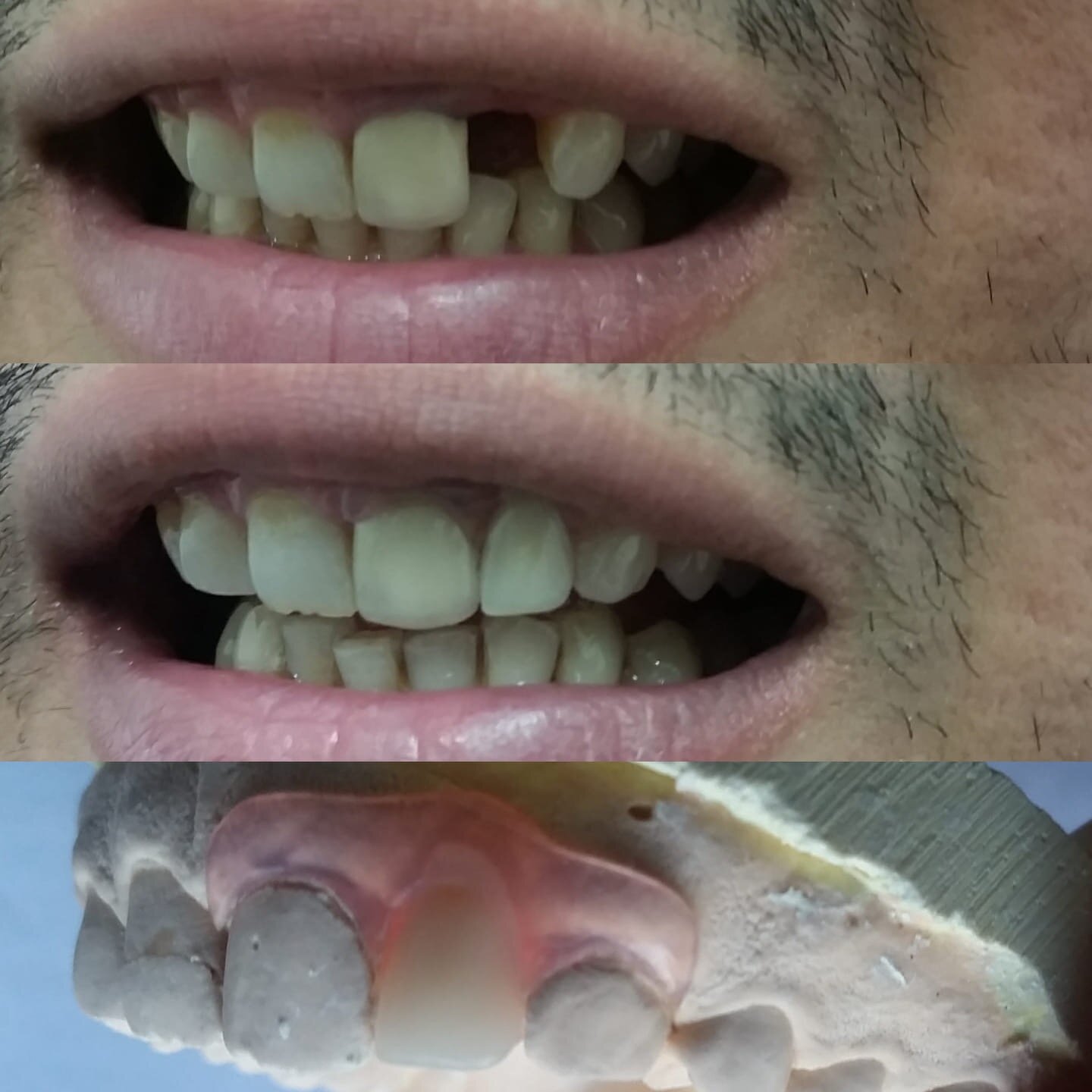Immediate or temporary dentures
What are immediate dentures?
Immediate dentures involve the removal of teeth and insertion of a denture at the same visit. The advantage is that you avoid any period without teeth.
Appointment Scheduling:
Before your teeth are removed a number of appointments is necessary to plan and prepare for the denture fabrication in the laboratory. You should also book an appointment with your dentist to extract the necessary teeth to synchronise all in time.
Appointment 1: At the initial consultation, after examining you, your dental prosthetist will take preliminary impressions of your existing teeth.
Appointment 2: Secondary impressions. This is an appointment where another set of more accurate impressions are taken. Bite and tooth shade might be recorded too.
Appointment 3: If you have quite a few teeth missing already you will have a wax try-in at this stage. The teeth are in the wax and by placing this denture replica in your mouth the operator and you will be able to see of what the final product will look like.
Appointment 4: At this appointment all the designated teeth are removed, stitches may be placed, and the denture is immediately fitted hence the name: an immediate denture.
Appointment 5: A review appointment - you might need a few of those visits. This is when all the necessary adjustments take place such as relieving of sore spots, bite adjustments and other.
After when your gums heal you might either need a reline, which means a new fitting surface for your denture or a completely new set of dentures. The new set of dentures will be much more aesthetically pleasing as the teeth can be now tried out in your mouth before finishing.
Having some or all of your teeth removed is a very emotional journey.
Even though it may feel like a big mile stone and a life changing experience, people are always very grateful for making that decision. Their looks are generally improved and general health is better too.
Unbreakable Flexible Dentures also known as Valplast or Nylon dentures
Flexible dentures are dentures, made of a thin thermoplastic such as nylon, which is a flexible material hence the name. They are also known as Valplast dentures.
They are custom-fabricated to fit each patient's unique anatomy, and are one of the most comfortable tooth replacement options available in the market. They are also lightweight, which allows patients to become accustomed to the dentures very quickly. They have no metal clasps which makes them quite aesthetically pleasant.
Benefits of flexible partials:
Superior aesthetics - perfect for patients with one or two teeth missing
Great comfort - much thinner than standard dentures and there is no taste to them
Patients find chewing easier
The speech is not affected as badly as it is with thicker dentures
Excellent function
Most biocompatible denture material in the market, non-allergenic
Great substitute for people who cannot effort the implants
Flexible and not brittle like standard dentures so they don’t shatter if they’re dropped
The material is translucent and allows the natural gum colour to show through - they look very natural and blend in perfectly
Less dental appointments needed to get the final product
They cling to the gums and don’t require metal clasps to hold them in place
Some patients feel that the appliance “disappears” or is “invisible” in their mouth, thus the aesthetics of it is far superior to conventional acrylic/metal partial dentures
Disadvantages:
The cost may be slightly higher than conventional acrylic partial denture because the fitting and finishing time at the lab is increased, but the result makes it well worth it
The additions (if a patient looses more teeth) can be time consuming and costly as the denture needs to be sent to the lab
Not suitable in every case and especially unsuitable for patients with gum disease
A Daily Denture Care Routine
A daily denture care routine will help to minimise odour and stains, keep your dentures looking like new and help them last longer.
Insertion and removal
Your dentist or prosthesist will show you how to put in and take out your denture. Feel free to ask them questions. Make sure you are comfortable with putting them in and taking them out before you leave the clinic.
Never use force to get your dentures in or out.
Function
Your new denture may feel strange, even if you have worn dentures before. This is normal and happens because your mouth takes time to adapt.
When you first eat with your new denture, start with soft foods (e.g. lightly cooked vegetables).
Take small bites and chew slowly. If you have natural teeth, try to bite with them rather than the artificial ones.
If possible, chew on both sides at the same time.
Overnight
Remove your dentures before going to bed each night. This gives your mouth a chance to rest and will help stop you grinding your teeth while you sleep.
Clean dentures well using liquid soap and a soft toothbrush. After cleaning, dentures can either be kept in a cup of fresh cold water, or left to dry.
Maintenance
Food debris and plaque need to be cleaned from all denture surfaces daily.
Clean your dentures using a soft toothbrush and mild soap and water or denture paste. Standard toothpaste is not recommended.
Clean your dentures over a hand-basin half filled with water to prevent breakage if dropped.
Brush your gums, tongue and palate (roof of your mouth) morning and night with a soft toothbrush before you insert your dentures. This stimulates circulation in your tissues and helps remove plaque.
If you find that your denture has a build up (tartar or calculus), soak it in white vinegar (1 part) and water (4 parts). If you still can’t remove the build up, call your dental clinic and make an appointment to have your denture repolished.
Denture cleaning illustration
If your denture breaks or is damaged, stop wearing it straight away. Do not try to repair it, bend it or modify it. Call your dental clinic for an appointment to fix it.
Mouth soreness
Your mouth may become a little sore under your new denture. If this happens, contact the clinic to arrange to have your denture adjusted.
If the soreness is severe it may help to remove the denture for at least part of the day. However, please wear the denture for a few hours before your appointment so we can work out where the adjustment is required.
Remember, do not adjust or try to repair your dentures.
Dentures should be well fitted and comfortable when you chew and your breath should be fresh. See your oral health professional if you have any pain or problems with your mouth or dentures or if you need further information on denture cleaning and care.








